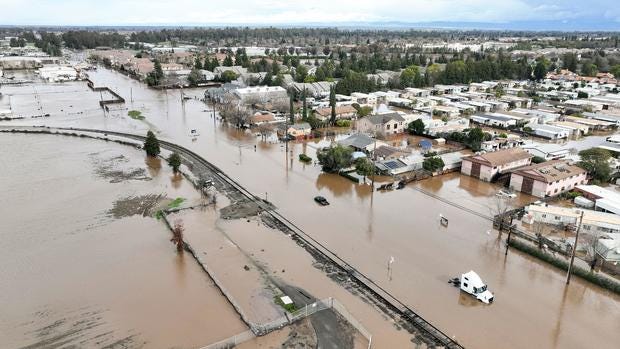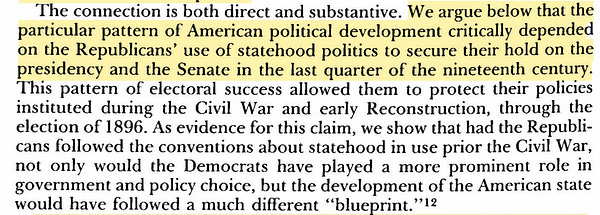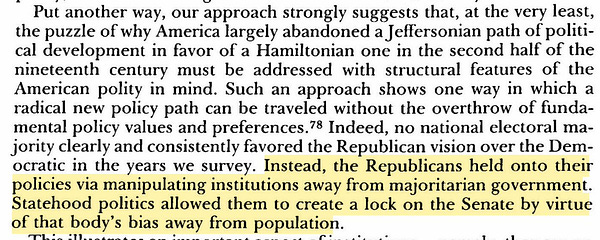Destabilized Saturday Edition #53
Climate impacts don't hibernate, Russian war crimes, Florida gets a jump on 2024, micro-dosing pants, why do we have two Dakotas?

Six weeks ago I wrote: “In the U.S. in the climate change era, life is much more normal-seeming in the winter than in the summer. Summer is the season of flooding, wildfires, extreme heat, and hurricanes; winter feels more like it always has.” What can I say, it seemed like a reasonable observation at the time. Since then, though, we’ve seen a series of climate-fueled extreme weather disasters:
Buffalo, New York was walloped by its worst blizzard ever: whiteout conditions, wind gusts of 70 mph caused wind chills of minus 30 Fahrenheit, and 51.9 inches of snow. At least 47 people died in the storm.
Scottsdale, Arizona stopped allowing nearby Rio Verde Foothills to buy its water, a move prompted by a growing recognition that the southwest’s drought isn’t temporary and the demands on Colorado River water are more than it can deliver.
California was drenched by record rainfall several times over a few weeks, causing widespread flooding, landslides, and infrastructure damage.
In Louisiana, an intense storm produced at least 21 tornados, leaving three people confirmed dead, homes and neighborhoods destroyed, and tens of thousands without power. (In other Louisiana climate impacts news, another insurance company recently exited the state).
In other parts of the world, Pakistan is struggling to recover from near-biblical flooding last summer; Argentina has been enduring scorching heat over 110 degrees, Brazil and Australia have experienced extreme flooding, and Somalia and other countries in East Africa remain mired in drought-caused extreme hunger.
If we’re experiencing weather extremes like this at between 1.0 and 1.5 degrees (celsius) of warming, what will we see over the next 10 years as temperatures rise further? How many system thresholds will we exceed in the coming years? In “Are Miami real estate buyers crazy, or am I?” I quoted Texas A&M climate scientist Andrew Dessler explaining that climate impacts are non-linear:
In a linear system, things change in straight line. If climate impacts are linear, then every 0.1°C of warming would give you the same amount of damage. In a non-linear world, on the other hand, every 0.1°C of warming produces larger damage than the previous 0.1°C. The reason for the non-linearity of climate impacts is that individuals and communities are impacted by climate when it passes thresholds. With 1.1°C of global-average warming, we are departing the climatic conditions that much of the infrastructure designed in the 20th century was designed for. Every 0.1°C of warming is going to push us past an exponentially increasing number of thresholds in the climate system.
The damage and destruction we’ve seen the last several years is just a preview of what the 2020s will bring. This is daunting, of course, but it can and should motivate us to make upgrading our infrastructure a generational ambition. If we can make human systems durable and resilient enough for our climate-changed world, we can someday achieve a new stability and a better world for our grandchildren and their kids.
My Work
Struggling to see what’s right in front of us (link)
Failing to understand discontinuities compounds their inherent risks, as investors and everyone else learned the hard way in the housing market crash. The inverse is also true, as Michael Burry showed: considerable advantages accrue to those able to see early and understand more fully the big structural transformations that are underway.
Interesting Reads
California’s storms are almost over. Its reckoning with flood insurance is about to begin. (link)
[I]n the coming weeks, as flood waters recede and the rains’ full impact comes into view, many residents may find themselves facing a second crisis: A widespread lack of flood insurance that will leave thousands of homeowners grappling with the cost of repairing and rebuilding homes. …“Many, many thousands of Californians will assume that they have flood coverage and find out that they don’t.”
Tweets of the Week









Extreme Weather Watch

Creeping Fascism Watch




Progress Joy and Hope










